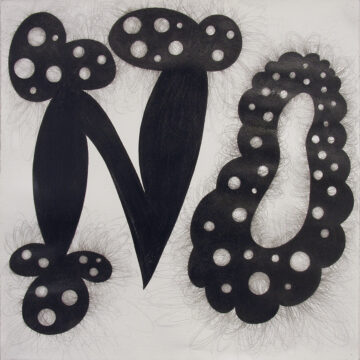by Andrea Scrima
#1: SAYING NO

In the talk Judith Butler gave upon receiving the Adorno Prize in 2012, she asks: “Can one lead a good life in a bad life?” Her question springs from a conclusion Theodor W. Adorno formulated in Minima Moralia: “Wrong life cannot be lived rightly” (“Es gibt kein richtiges Leben im falschen”). Years later, he speculated whether modern humans were already too damaged to live in a right world, should such a world ever come into being. Butler nonetheless asks if it’s morally permissible to “wish simply to live a good life in the midst of a bad life,” but concedes that it’s not so simple. It would seem that to pursue the “good” life, one must reject the “bad” life and everything it demands from us. Yet isn’t the term “the good life” already far too tainted by consumerism to be of any real use?
Let’s speak instead of a “true life” as opposed to a “false life.” But what is the nature of this undertaking, and what would the true life entail? The fact that we are interdependent and vulnerable beings presupposes a set of conditions required for even a minimally decent life: food, shelter, clothing, a halfway functioning society, some kind of livelihood. Butler reminds us of Hannah Arendt’s observation that it’s not enough to be alive, to merely survive—that for a life to be considered a life, it has to be lived with meaning and purpose.
Thus, our demand must be not merely for life, but for a liveable life. And yet our lives are not entirely in our hands; they are subject to political and economic structures that rob individuals and entire peoples of their agency and doom them to precarity, and often worse. In Problems of Moral Philosophy, Butler reminds us, Adorno asks “how the broader operations of power and domination enter into, or disrupt, our individual reflections on how best to live.” Read more »

 This past spring, I found myself sitting, masked, at a wooden desk among a scattering of scientific researchers at the Museo Galileo in Florence. Next to me was a thick reference book on the history of astronomical instruments and a smaller work on the sundials and other measuring devices built into the churches of Florence to mark the cyclical turning points of cosmic time. The gnomon of Santa Maria del Fiore, for instance, consisted of a bronzina, a small hole set into the lantern ninety meters above that acted as a camera oscura and projected an image of the sun onto the cathedral floor far below. At noon on the day of the solstice, the solar disc superimposed itself perfectly onto a round marble slab, not quite a yard in diameter, situated along the inlaid meridian. I studied the explanations of astronomical quadrants and astrolabes and the armilla equinoziale, the armillary sphere of Santa Maria Novella, made up of two conjoined iron rings mounted on the façade that told the time of day and year based on the position of their elliptical shadow, when all at once it occurred to me that I’d wanted to write about something else altogether, about a person I occasionally encountered, a phantom living somewhere inside me: the young woman who’d decided not to leave, not to move to Berlin after all, to rip up the letter of acceptance to the art academy she received all those years ago and to stay put, in New York. Alive somewhere, in some other iteration of being, was a parallel existence in an alternative universe, one of the infinite spheres of possibility in which I’d decided differently and become a different woman.
This past spring, I found myself sitting, masked, at a wooden desk among a scattering of scientific researchers at the Museo Galileo in Florence. Next to me was a thick reference book on the history of astronomical instruments and a smaller work on the sundials and other measuring devices built into the churches of Florence to mark the cyclical turning points of cosmic time. The gnomon of Santa Maria del Fiore, for instance, consisted of a bronzina, a small hole set into the lantern ninety meters above that acted as a camera oscura and projected an image of the sun onto the cathedral floor far below. At noon on the day of the solstice, the solar disc superimposed itself perfectly onto a round marble slab, not quite a yard in diameter, situated along the inlaid meridian. I studied the explanations of astronomical quadrants and astrolabes and the armilla equinoziale, the armillary sphere of Santa Maria Novella, made up of two conjoined iron rings mounted on the façade that told the time of day and year based on the position of their elliptical shadow, when all at once it occurred to me that I’d wanted to write about something else altogether, about a person I occasionally encountered, a phantom living somewhere inside me: the young woman who’d decided not to leave, not to move to Berlin after all, to rip up the letter of acceptance to the art academy she received all those years ago and to stay put, in New York. Alive somewhere, in some other iteration of being, was a parallel existence in an alternative universe, one of the infinite spheres of possibility in which I’d decided differently and become a different woman.
 In one sense, the stories of the collection Almost No Memory, originally published in 1997 and reprinted in The Collected Stories of Lydia Davis in 2009, can be read as a psychological portrait of a middle-aged woman coming to terms with all the usual things life has to offer after a certain age: the convolutions of domestic discord, shrinking horizons, the sobering insight that very little can change us anymore. The voices are both many and one, converging in a polyphony of percipient anxiety and resignation: we hear “wife one,” an “often raging though now quiet woman” eating dinner alone after talking on the phone to “wife two”; a professor who fantasizes about marrying a cowboy, although she is “so used to the companionship of [her] husband by now that if I were to marry a cowboy I would want to take him with me”; and a woman who “fell in love with a man who had been dead a number of years.” There is also a woman who “comes running out of the house with her face white and her overcoat flapping wildly,” crying “emergency, emergency”; a woman who wishes she had a second chance to learn from her mistakes; and one who has “no choice but to continue to proceed as if I know altogether what I am, though I may also try to guess, from time to time, just what it is that others know that I do not know.” The list continues, from a woman wondering why she can become so vicious with her children to another whose mind wanders to sex at the sight of “anything pounding, anything stroking; anything bolt upright, anything horizontal and gaping” and one who is filled with “ill will toward one I think I should love, ill will toward myself, and discouragement over the work I think I should be doing.”
In one sense, the stories of the collection Almost No Memory, originally published in 1997 and reprinted in The Collected Stories of Lydia Davis in 2009, can be read as a psychological portrait of a middle-aged woman coming to terms with all the usual things life has to offer after a certain age: the convolutions of domestic discord, shrinking horizons, the sobering insight that very little can change us anymore. The voices are both many and one, converging in a polyphony of percipient anxiety and resignation: we hear “wife one,” an “often raging though now quiet woman” eating dinner alone after talking on the phone to “wife two”; a professor who fantasizes about marrying a cowboy, although she is “so used to the companionship of [her] husband by now that if I were to marry a cowboy I would want to take him with me”; and a woman who “fell in love with a man who had been dead a number of years.” There is also a woman who “comes running out of the house with her face white and her overcoat flapping wildly,” crying “emergency, emergency”; a woman who wishes she had a second chance to learn from her mistakes; and one who has “no choice but to continue to proceed as if I know altogether what I am, though I may also try to guess, from time to time, just what it is that others know that I do not know.” The list continues, from a woman wondering why she can become so vicious with her children to another whose mind wanders to sex at the sight of “anything pounding, anything stroking; anything bolt upright, anything horizontal and gaping” and one who is filled with “ill will toward one I think I should love, ill will toward myself, and discouragement over the work I think I should be doing.”